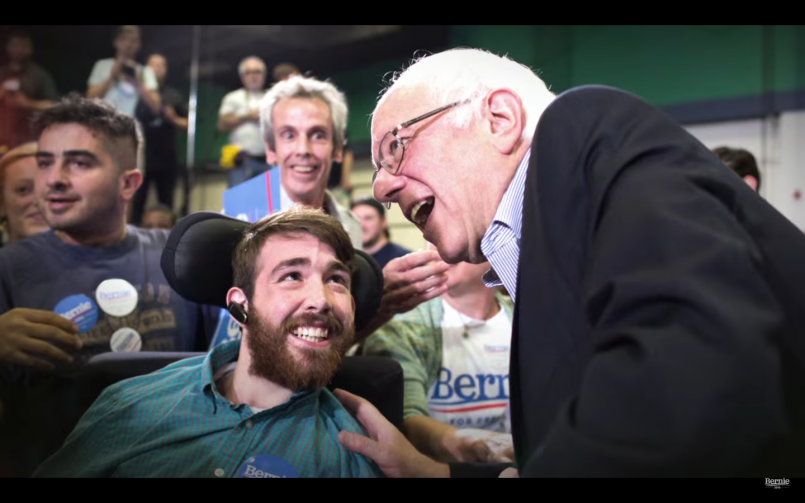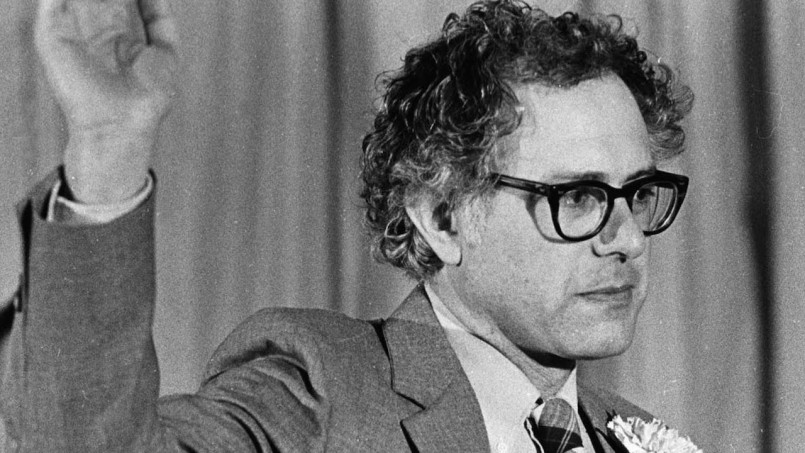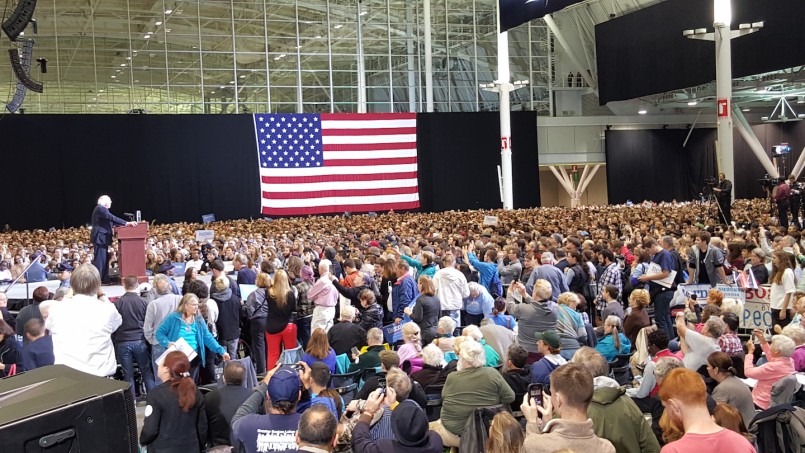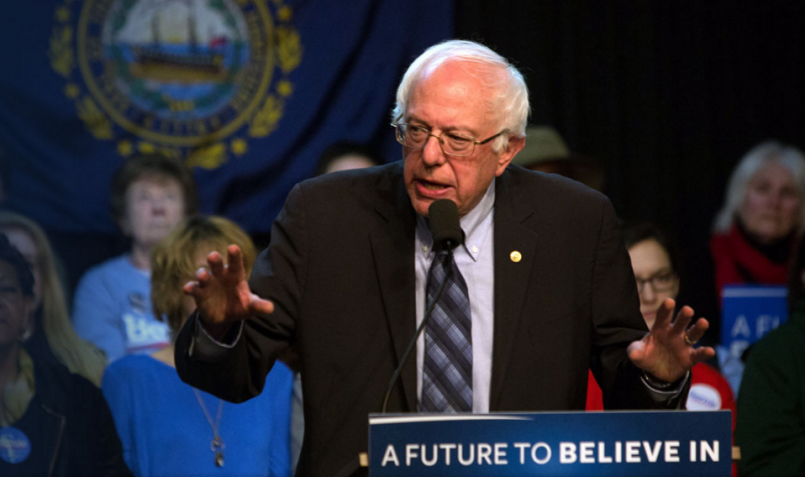
“If there is anything in the past that shows us that Bernie Sanders can win, it is Ronald Reagan’s victory in 1980. Before that, going too far left or too far right of the party leadership was considered political suicide—after Reagan won, that all changed. Bernie is really just following in the footsteps of our most progressive presidents like FDR. If the people continue to rally around Sanders like they are now and he can manage to get his message out to enough people, he could win.” – Lisa Langenbach, Ph.D
The year is 2016. Phones have replaced nearly every personal device we own, television can be paused and rewound, same-sex marriage is legal, and a 74 year-old, openly nonreligious, extremely liberal, democratic socialist with a heavy Brooklyn accent is running for the office of the President of the United States—and doing quite well.
Bernard “Bernie” Sanders, from the state of Vermont, has been a mayor, a member of the House of Representatives, and a U.S. Senator. Until this presidential race, Sanders has been extremely well-known and well-liked in his own district but relatively unknown to the rest of the country. Even in the face of that, he has decided to take on former Secretary of State, U.S. Senator, and First Lady, Hillary Clinton, arguably one of the most recognizable and powerful politicians in the entire world.
Following the results of the Iowa Democratic Caucus, in which Sanders took 49.6% of the delegates compared to Clinton’s 49.9%, the conversation has definitely shifted from the prior discussion of his viability as a candidate to his chances of winning the Democratic primary and after that, the general election. To be clear, a surge of interest doesn’t necessarily make a candidate’s election a sure thing, but it can be indicative of a possible challenger to the frontrunner. In order to really gauge the importance of the man who has many in this country “feeling the Bern,” we must take a deeper look into the life, record, and policies of Vermont Senator and presidential candidate, Bernie Sanders. Are his positions feasible? What effect would they have on American society and politics?

Who is Bernie Sanders?
Born in Brooklyn, New York City, New York on September 8, 1941, Bernie Sanders is the child of a Polish immigrant, Eli Sanders, and a first-generation Polish-American, Dorothy Glassberg. A Jewish family of modest means, the Sanders family lived in a rent-controlled apartment for most of Bernie’s early life. After graduating high school, where he ran track and was involved with the student government association, Sanders attended Brooklyn College from 1959-60 before transferring to the University of Chicago in 1960. Before he graduated with a bachelor’s degree in political science in 1964, Sanders lost both of his parents.
While attending university, Sanders was actively involved in the Civil Rights movement, organizing and attending marches and speeches throughout the early 1960’s, including those of Martin Luther King, Jr. He and 32 other students were arrested in the fall of 1962 for participating in the first Chicago sit-in for racial equality. He was also a member of the now defunct Young People’s Socialist League, a radical left-wing student organization that was popular on various college campuses during the 1960’s.
After receiving his degree, Sanders entered the political arena for the first time in 1971 in a gubernatorial race in Vermont, his home from 1970 to this day. He was the Liberty Union’s candidate, a third party that originated as an anti-war movement but spread its reach into other social issues and community concerns. Sanders was not successful in this first election; he came in third behind both the Republican and Democratic candidates. Sanders ran again for the same position in 1976 but failed to gain enough votes to win. He retired from the Liberty Union at the beginning of 1977.
In 1980, a friend suggested that Sanders aim a little lower and run for the mayor of Burlington, Vermont’s largest city, where he had been living for a decade. Running as an Independent against a 5-term Democratic candidate (whom the Republicans had considered so formidable that they decided not to even run) Bernie Sanders won the election by a margin of just 10 votes. Sanders would go on to be re-elected 3 times and enjoyed high approval ratings and community support throughout his tenure. In 1987, during his final term as mayor, Sanders was named by US News as one of the best mayors in the country and, to this day, Burlington still ranks high on the country’s list of most enjoyable cities to live in.
In 1989, Sanders left office to teach political science at Harvard University’s prestigious Kennedy School and in 1991 he taught the same subject at Hamilton College in Clinton, NY. In 1990, Sanders ran and won as the first openly socialist candidate to seek a position in the U.S. House of Representatives. He would serve in the House for another 16 years before running for the U.S. Senate in 2006, again winning as an Independent. From 2006 until today, Sanders has caucused with the Democratic Party. He became known for his strong objections to the Iraq War, the Patriot Act, and the repeal of the Glass-Steagall Act, an action that many economists believe helped lead the country into the Great Recession of 2008. A poll conducted in 2011 found Sanders to have a 67% favorability rating among his constituents, making him the third most popular U.S. Senator in the country at the time.
In 2015, Bernie Sanders formally announced his intentions to run in the 2016 Presidential race and filed the paperwork with the FEC in order to begin his long journey to where we find him today.
What Does Bernie Sanders Promise To Do As President?
- Make all public universities tuition-free through a tax on Wall Street speculation.
- Institute a single-payer healthcare system that would cover each and every U.S. citizen, known as “Medicare-for-all,” similar to what other first-world nations currently have today.
- Raise the federal minimum wage to $15 an hour.
- Pressure the Supreme Court to reverse its decision on the infamous Citizens United case that fundamentally changed the way campaign finance law is understood.
- Form an international coalition comprised of the U.S. and its allies (most importantly those in the Middle East like Saudi Arabia and Israel) in order to destroy the Islamic State (ISIS).
- Break up the big banks and increase regulation on financial trading.
- Raise taxes on the wealthy in order to directly improve infrastructure and simultaneously provide millions of jobs to currently unemployed Americans through a public works program.
The full Bernie Sanders platform can be found here.

What Would The Effects Of These Policies Be?
According to Dr. Lisa Langenbach, a political science professor at Middle Tennessee State University, much of Bernie’s platform could bring positive changes to American society if he is able to get them through a recalcitrant or antagonistic Congress, which is unlikely, given the current political climate. Dr. Langenbach goes on:
“The big problem is that, like with President Obama, a Sanders administration would face extreme opposition from the Republicans and possibly from some of his Democratic colleagues as well. The American people agree with many of Bernie’s positions but in order to get them pushed through, the public would have to call on their representatives to cast votes for them. With a population that already feels disenfranchised, this would be quite challenging to accomplish.
For example, a tax on Wall Street speculation would affect a very small portion of the electorate, yet in order to get something like it passed, large numbers of the public would have to not only support the proposal, but make sure that their representatives know that they do. Tuition-free college is something that most people in the country might see as a positive change, especially in a time in which many college graduates leave school in debt and without a job, but would be marketed by the Republican party (and even Hillary Clinton) as a pipe dream that wouldn’t be financially feasible. Higher rates of education has been proven to be linked to decreases in crime and domestic abuse, increases in income, higher voter turnout, and an overall rise in quality of life.
A single-payer, or “Medicare-for-all,” healthcare system could be one of his biggest challenges to sell to the American people. After just barely passing a few years ago, the Affordable Care Act has proven to be extremely polarizing, with some people arguing that without it, they would have never been covered and possibly died, while others complain of higher premiums and lower quality of care. A single-payer system wouldn’t exactly “rip up Obamacare,” as Hillary Clinton has claimed, but it would push the country back into a battle over healthcare in an attempt to go further towards the idea of true universal healthcare. Bernie’s position seems to be an incremental shift towards covering every American man, woman, and child, first covering all those who still don’t have healthcare and then expanding beyond that by categories of people.
In regards to Bernie’s support of a raise to a $15 an hour federal minimum wage, the numbers are on Bernie’s side. Many studies, including this report from the United States Department of Labor, show that an increased minimum wage would benefit society as a whole and does not create massive unemployment as opponents of the movement claim it would. Dr. Langenbach believes that something like $12 an hour would be much more feasible in a more rural part of Tennessee, for example, while $15 an hour would be better for a more expensive and urban area like New York City. Here’s where Bernie Sanders could find some compromise with his detractors and possibly recommend a $12 an hour proposal and then allow the state’s to work from there to try and decide on further increased wages based upon their local economy. Arguments for and against the position, specifically concerning one of the country’s largest minimum wage employer sectors, the fast-food industry, can be found here and here, respectively.
Another passionate subject for Bernie Sanders is campaign finance reform, something that again sets him apart from many of his potential challengers. The Citizens United case that was heard and decided upon by the Supreme Court in 2010 changed a lot of the ways that our government officials can receive campaign funds, specifically from larger donors and in larger amounts. Sanders argues that the ability for corporations and the wealthy to contribute funds in such high numbers negatively affects the average American and tips the scales in the favor of the country’s most fortunate.
Again, according to Dr. Langenbach, most American people would agree that the wealthy’s ability to donate so much money to particular candidates and causes is a concern. Many would like to see the vast influence of big money eliminated from American politics and see Citizens United overturned but must more loudly make these views heard. Without massive public support and cries for action, the scales are unlikely to tip back the other way any time soon, if ever. The same goes with breaking up the big banks and raising taxes on the top earners in the country. All of these ideas would benefit the great majority of the country but would require huge levels of support and vocalization from the electorate.

What does Bernie Sanders Need To Do In Order To Win?
“He would really benefit from winning early states like Iowa and New Hampshire (this interview was conducted prior to the 2016 Iowa Caucus) and signs are showing that he’ll win in New Hampshire and have at least a good show of support in Iowa,” says Dr. Langenbach. This sentiment has echoed through most of the political world. While Sanders has a bit of a natural advantage in New Hampshire, being that he is from a neighboring state and popular among white progressive liberals, his performance in Iowa depended on a great many factors. Although he did lose Iowa (still called and considered to be a “virtual tie” by many people in the field,) he still picked up delegates in the state and, perhaps most importantly, showed people who might not have been familiar with him before that he is a viable alternative to the former Secretary of State, Hillary Clinton. Dr. Langenbach says that the few delegates that he did win are not nearly as important as the momentum that is gained by the recognition that Sanders tied with Clinton in Iowa, when just a year before, he was expected to win only 7% of the state.
It will remain to be seen how Sanders performs in states like Nevada and South Carolina, where he does have support, but not nearly enough yet to win. Popular among white, liberal, and young voters, Sanders has to reach out to other sections of the voting bloc, primarily minorities and older Democrats who are familiar with Clinton, or he won’t be able to take the nomination this summer.
Whether or not Bernie Sanders manages to become our next President, he has managed to break into a race in which Clinton was assumed to be the nominee and run a powerful campaign that was extremely underestimated from the start.
What do you think? Are you “feeling the Bern?” Does Bernie Sanders have a chance? Tell us in the comments below.
David is a writer, student at Middle Tennessee State University, and digital content producer at 301 Digital Media. He likes listening to the same songs over and over again, cooking, and stirring up trouble on Facebook. Follow him on Twitter and Instagram: @Dave_Trace



